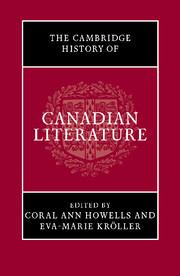Book contents
- Frontmatter
- Introduction
- PART ONE OLD AND NEW WORLD, LA NOUVELLE-FRANCE, THE CANADAS, DOMINION OF CANADA
- PART TWO THE POST-CONFEDERATION PERIOD
- 7 Post-Confederation poetry
- 8 Writing by Victorian naturalists
- 9 Short fiction
- 10 Bestselling authors, magazines, and the international market
- 11 Textual and social experiment in women’s genres
- 12 Canada and the Great War
- PART THREE MODELS OF MODERNITY, POST-FIRST WORLD WAR
- PART FOUR AESTHETIC EXPERIMENTS, 1960 AND AFTER
- PART FIVE WRITING IN FRENCH
- Bibliography
- Index
- References
8 - Writing by Victorian naturalists
from PART TWO - THE POST-CONFEDERATION PERIOD
Published online by Cambridge University Press: 28 September 2010
- Frontmatter
- Introduction
- PART ONE OLD AND NEW WORLD, LA NOUVELLE-FRANCE, THE CANADAS, DOMINION OF CANADA
- PART TWO THE POST-CONFEDERATION PERIOD
- 7 Post-Confederation poetry
- 8 Writing by Victorian naturalists
- 9 Short fiction
- 10 Bestselling authors, magazines, and the international market
- 11 Textual and social experiment in women’s genres
- 12 Canada and the Great War
- PART THREE MODELS OF MODERNITY, POST-FIRST WORLD WAR
- PART FOUR AESTHETIC EXPERIMENTS, 1960 AND AFTER
- PART FIVE WRITING IN FRENCH
- Bibliography
- Index
- References
Summary
What is here?
“Science does not always appear, as on the present occasion, in holiday attire,” Mr. William Dawson, the Principal of McGill College, warned the members of the Montreal Society of Natural History and assorted guests on a May evening in 1856. More than 150 ladies and gentlemen, the “elite of the city and neighborhood,” had shown up for the soirée the society had organized in honor of Sir William Logan, the Director of the Geological Survey of Canada. The guests were having fun. After the requisite speeches, they inspected the museum, peered through three powerful microscopes that had been set up for their amusement, and partook of the refreshments in the library. But now it was Mr. Dawson’s turn. Science, he declared, means sacrifice. “It scales every mountain, gropes in every mine, toils through every wilderness, boils its camp kettle by all streams, pores over the minutest objects, anatomises the least agreeable creatures, stifles itself in laboratory fumes, breaks stones like a road maker, and carries loads like a porter.” A true scientist, Mr. Dawson added, is someone people look at and say: “[He] has seen better days.” As if he realized that he wasn’t about to convert anyone in the audience who wasn’t already a scientist, he quickly shifted gears: really, what he meant was that science was, above all, a way of getting people to talk to each other – which was precisely the purpose of a fine natural history society like the present one. Just in time.
- Type
- Chapter
- Information
- The Cambridge History of Canadian Literature , pp. 144 - 165Publisher: Cambridge University PressPrint publication year: 2009
References
- 1
- Cited by

